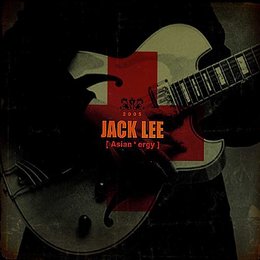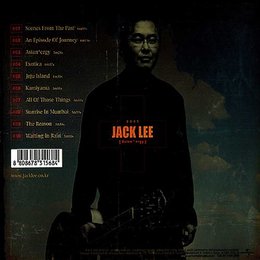As long as I have known Jack Lee (we met in New York City in 1990 and I did liner notes for his 1992 Warner Bros. release Magnolia Blossom), he has always consistently been about two things -- melody and groove. An accomplished player and outstanding improviser who cites John McLaughlin, Pat Metheny and Toninho Horta as his main guitar influences, Jack combines formidable technique with a penchant for gentle, flowing lyricism that makes his music eminently appealing to both musicians and non-musicians alike.
On his latest project with the exciting new world music ensemble Asian*ergy, Jack summons up some of his most heartfelt, emotionally moving playing on record to date. Spurred on by an international cast of sidemen -- Indian drummer/percussionist Lewis Pragasam (currently living in Malaysia), Indian tabla player Suphala (currently living in New York), wind driven synthesizer specialist Norihito Sumitomo from Japan and keyboardist Charles Blenzig from the United States -- Lee hits some inspired peaks on both electric and nylon string acoustic guitars. Special guests Harvey Mason on drums and Dave Grusin on piano elevate the proceedings on two songs (“Scenes from the Past” and “Episode of Journey”) while the great Brazilian guitarist Toninho Horta, a longtime friend and colleague of Lee’s, lends his intimate vocals and alluring acoustic guitar work to three tracks (“Asianergy,” “Chejudo” and “All of Those Things”).
Recorded jointly in Malaysia, Thailand and Korea between 2004 and 2005, Jack Lee & Asian*ergy is the first release in five years by the talented player-producer who currently resides in Seoul and also spends time working on music projects in China and Japan. At the core of this superb recording (his seventh as a leader) is the chemistry between Lee and kindred spirit Pragasam, whose powerfully polyrhythmic approach to hand percussion and the drum kit fuels the momentum of these sessions.
“Lewis is amazing,” says Jack. “He used to have a band called Asiabeat which was very successful in Europe during the early ‘90s. He’s a great percussionist and also a fantastic drummer. I had him play drums on Bob James’ upcoming record Angels of Shanghai, which I produced and which we recorded in China. But Lewis also has the weirdest approach to hand percussion that I’ve ever seen. He’s got a totally original way of playing grooves and coloring the music with his whole assortment of exotic instruments. The reason why I wanted to make this record is mainly due to the musical bond that I forged with Lewis and our desire to have this new concept band. He was definitely the inspiring force for this record. In fact, a lot of the songs on this album were inspired by listening to his unique grooves.”
“Exotica” is a case in point. Pragasam’s forceful dumbek playing and assorted percussive colorings provide the initial foundation from which Blenzig’s darkly dramatic elegy sprung. Jack’s nylon string acoustic guitar work in unison with Blenzig’s piano is a particularly potent combination on this stirring number, and both players solo with a depth of emotion that is beautiful and affecting.
The buoyant, breezy opener “Scenes from the Past” incorporates an infectious groove of another kind, as Lee explains. “That is a special baiao rhythm that comes from Toninho’s latest album called Como Foro, where he assembled all these Brazilian percussionists from Minas Gerais. It’s a rhythm that he gave me to use, and that gave me the inspiration to write that song.” Jack’s playing here is typically melodious and fluid in a Metheny vein, underscored by layers of rhythmically strummed acoustic guitars, with some allusions to jazz guitar legend Wes Montgomery along the way.
Sumitomo’s “Episode of Journey” is a dynamic offering that alternately features Lee’s serene nylon string acoustic guitar in the head and solo sections and his more aggressive electric work on the bridge. Mason provides a steady waltz-time pulse underneath while Grusin layers on cascading piano statements throughout the engaging piece
The title track, an energized romp paced by more of Pragasam’s spirited polyrhythmic grooving, features some of Jack’s most overtly boppish lines on the recording while he takes a decidedly unhurried approach on the alluring ballad “Chejudo.” Sumitomo’s sampled harmonica on EWI (Electronic Wind Instrument) adds a luminous touch to this melodic gem.
The group delves into the funky side of fusion on Sumitomo’s“Kamiyama,” which is powered by Pragasam’s slamming backbeat and Blenzig’s imposing synth bass lines. Lee dials up some nasty distortion on his electric guitar here and lets loose with edgy rock-fueled abandon on this earthy throwdown. On the extreme opposite end of the dynamic scale is Horta’s lovely bossa nova “All of Those Things,” a soothing number that also highlights Sumitomo’s soaring soprano sax solo along with another Metheny-inspired guitar solo from Lee.
“Asia” opens with a South India percussion jam with Pragasam and Bobby Singh on konokol (a rhythmically intricate vocal tradition that might be considered the Indian equivalent of jazz scat singing). The initial explosion of tabla and various hand percussion and konokol segues to another warm-toned stream of jazzy, cascading notes from Lee’s guitar; the perfect blend of East and West.
The closer, “Waiting in Rain,”opens on an introspective note with solo acoustic guitar before Pragasam’s hand percussion enters, trigggering a deluge of warm-toned notes from Lee’s electric guitar. As it picks up momentum on the strength of urgently strummed acoustic guitars, this energized piece in seven serves as a launching pad for more impressive fretboard pyrotechnics by Seoul’s homegrown guitar hero.
Says Lee of his five-year period of inactivity that preceeded this auspicious recording debut of Asian*ergy: “A lot of things happened to interrupt the flow of recording. My last record came out in 2000. In 2002, about six months after 9/11, I decided to leave New York. My wife had just gotten laid off from her fashion design job there; she was depressed, I was depressed. So we decided to move back to Korea, which seemed like a good idea at the time under the circumstances. But after living in New York for 20 years, going back to Korea was kind of a culture shock for both of us. Eventually, she got a job teaching fashion design at a school in Shanghai and I got very busy doing all kinds of session work in Japan and Korea. Also, I was never really inspired to do a record of my own during that period. But last year meeting Lewis Pragasam and also seeing concerts in Korea by great musicians like John McLaughlin with Shakti and Pat Metheny with his latest band really inspired me to get back into the mode of making music again.”
And with Asian*ergy, Jack has found the perfect vehicle to express that newfound inspiration. -- Bill Milkowski
Bill Milkowski is a regular contributor to Jazz Times and Jazziz magazines in the United States. He was named Writer of the Year for 2004 by the Jazz Journalists Association. He is also the author of “JACO: The Extraordinary and Tragic Life of Jaco Pastorius” (Backbeat Books). ....
 ....
.... 







